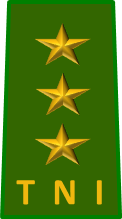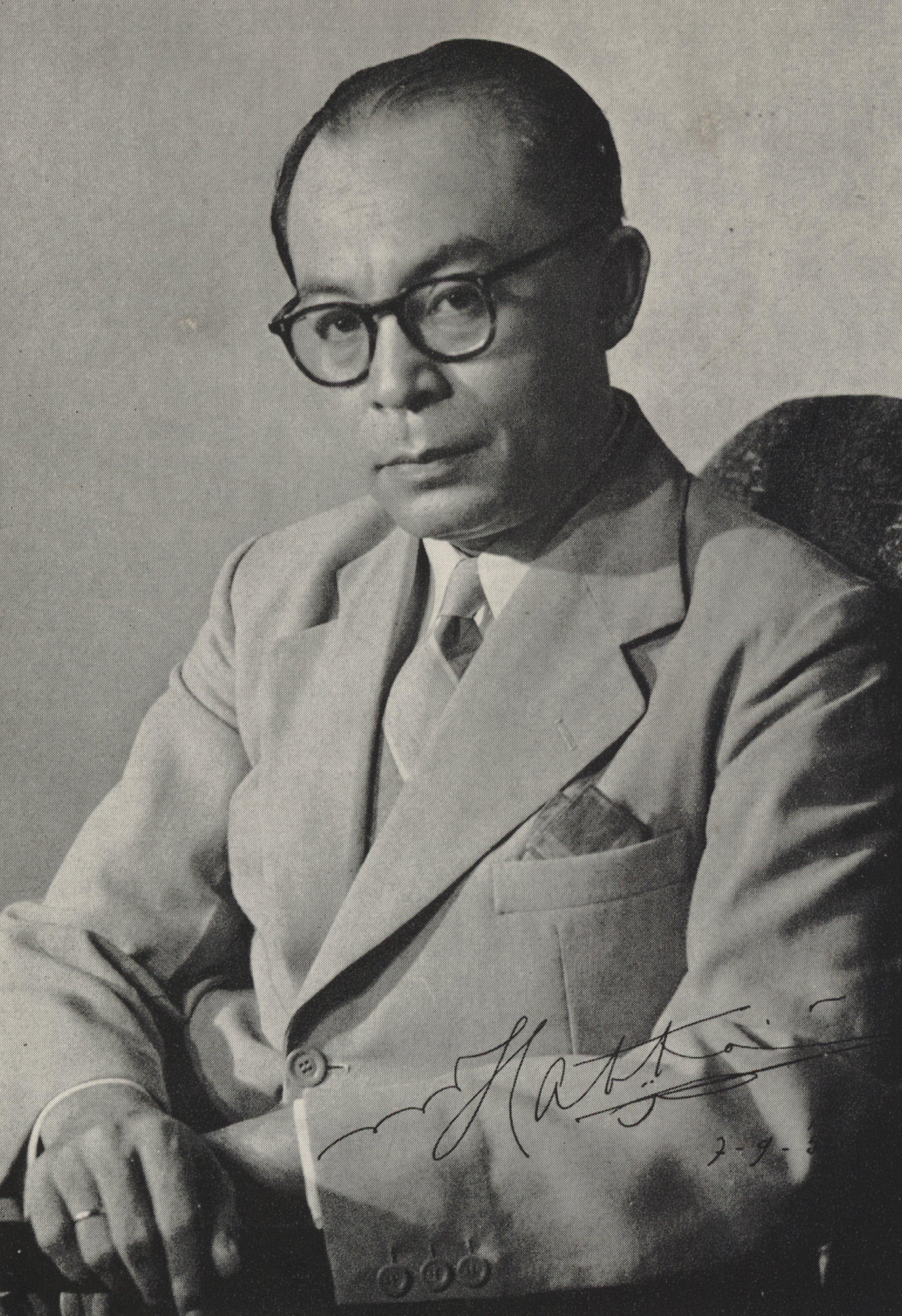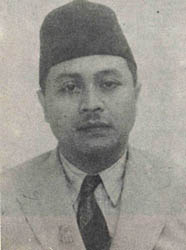|
Sudharmono
Sudharmono ( EVO: Soedharmono; 12 March 1927 – 25 January 2006), also known by his nickname, Pak Dar, was an Indonesian politician and army officer, who served as the 5th Vice President of Indonesia, under the New Order regime of president Suharto, serving from 1988 until 1993. Previously, he served in a number of positions in the government and military, including as the Chairman of Golkar, State Secretary of Indonesia, and a Lieutenant General in the army. Sudharmono was born on 12 March 1927, in Gresik, East Java. He completed his Middle School education in 1945. Following the Proclamation of Indonesian Independence, he dropped out from any further education to join the army in the Indonesian National Revolution. He became the Commander of the Ronggolawe Division in the army, a position which he held throughout the course of the war. After the Dutch retreated from Indonesia in 1949, Sudharmono completed his Secondary Education before going to Jakarta in 1952 to join the ... [...More Info...] [...Related Items...] OR: [Wikipedia] [Google] [Baidu] |
Umar Wirahadikusumah
Umar Wirahadikusumah (; 10 October 1924 – 21 March 2003) was an Indonesian politician and former army general, who served as the fourth Vice President of Indonesia, serving from 1983 until 1988. Previously, he was chair of the Audit Board of Indonesia from 1973 until 1983, and Chief of Staff of the Indonesian Army from 1969 until 1973. Born on 10 October 1924, to a noble Sundanese family. He was educated at the Europeesche Lagere School Tasikmalaya and Meer Uitgebreid Lager Onderwijs Pasundan. He entered the military in 1943, during the Japanese occupation. He would go on to serve in the Indonesian Army during and after the Indonesian National Revolution, seeing combat in the Madiun Affair and the PRRI rebellion. After hearing about the kidnapping of six Generals and seeing unidentified troops occupying the Merdeka Square, Umar sent word to Kostrad Commander, Major General Suharto of the events which had just unfolded and requested his assistance. Umar accepted Suharto's ... [...More Info...] [...Related Items...] OR: [Wikipedia] [Google] [Baidu] |
Try Sutrisno
Try Sutrisno (; born 15 November 1935) is an Indonesian politician and retired army general who served as the country's sixth vice president. He held the office from 11 March 1993 to 11 March 1998. Previously, he served as the Commander of the Republic of Indonesia Armed Forces for five years. Early life Try Sutrisno was born on 15 November 1935 in Soerabaia (Surabaya), now of East Java. His father, Subandi, was an ambulance driver, and his mother, Mardiyah, was a housewife. After the Indonesian Proclamation of Independence in 1945, the Dutch returned to reclaim Indonesia as their colony. Try and his family moved from Surabaya to Mojokerto. His father worked as a medical officer for the Poncowati Army Battalion, forcing Try to stop his schooling and make a living as a cigarette and newspaper seller. At age 13, Try wanted to join the Poncowati Battalion and fight, but no one took him seriously, and he ended up being employed as a courier. Try's duty was to find information on ... [...More Info...] [...Related Items...] OR: [Wikipedia] [Google] [Baidu] |
Vice President Of Indonesia
The vice president of the Republic of Indonesia ( id, Wakil Presiden Republik Indonesia) is second-highest officer in the executive branch of the Indonesian government, after the president, and ranks first in the presidential line of succession. Since 2004, the president and vice president are directly elected to a five-year term. Ma'ruf Amin is the 13th and current vice president of Indonesia. He assumed office on 20 October 2019. History of the office The Indonesian vice presidency was established during the formulation of the 1945 Constitution by the Investigating Committee for Preparatory Work for Independence (BPUPK). The office was first filled on 18 August 1945 when Mohammad Hatta was elected by acclamation. The election was conducted by the Preparatory Committee for Indonesian Independence (PPKI) because the body responsible for the vice presidential elections, the People's Consultative Assembly (MPR), had not been formed yet. On 16 October 1945, Hatta announce ... [...More Info...] [...Related Items...] OR: [Wikipedia] [Google] [Baidu] |
Golkar
) , foundation = , youth = AMPG (Golkar Party Young Force) , women = KPPG (Golkar Party Women's Corps) , newspaper = '' Suara Karya'' (1971–2016) , headquarters = Jakarta , ideology = PancasilaConservatism National conservatismEconomic liberalismIndonesian nationalismSecularism SuhartoismCatch-all party During the New Order:Big tentRight-wing authoritarianism , political_position = , anthem = ''Mars Partai Golkar'' , national = Onward Indonesia CoalitionUnited Indonesia Coalition , BallNo = 4 , DPRseats = , DPRD1seats = , labour = , website = , footnotes = The Party of Functional Groups ( id, Partai Golongan Karya), often known by its abbreviation Golkar, is a political party in Indonesia. It was founded as the Joint Secretariat of Functional Groups ( id, Sekretariat Bersama Golongan Karya, links=no, Sekber Golkar) i ... [...More Info...] [...Related Items...] OR: [Wikipedia] [Google] [Baidu] |
Golongan Karya
) , foundation = , youth = AMPG (Golkar Party Young Force) , women = KPPG (Golkar Party Women's Corps) , newspaper = ''Suara Karya'' (1971–2016) , headquarters = Jakarta , ideology = PancasilaConservatismNational conservatismEconomic liberalismIndonesian nationalismSecularism SuhartoismCatch-all party During the New Order:Big tentRight-wing authoritarianism , political_position = , anthem = ''Mars Partai Golkar'' , national = Onward Indonesia CoalitionUnited Indonesia Coalition , BallNo = 4 , DPRseats = , DPRD1seats = , labour = , website = , footnotes = The Party of Functional Groups ( id, Partai Golongan Karya), often known by its abbreviation Golkar, is a political party in Indonesia. It was founded as the Joint Secretariat of Functional Groups ( id, Sekretariat Bersama Golongan Karya, links=no, Sekber Golkar) in ... [...More Info...] [...Related Items...] OR: [Wikipedia] [Google] [Baidu] |
Ministry Of State Secretariat (Indonesia)
The Ministry of State Secretariat () is a government ministry responsible for providing technical, administrative, and analytical support to the President and Vice President in the exercise of their state powers. The current minister of state secretariat is Pratikno, who previously served as Rector of Gadjah Mada University in Yogyakarta. Duties The State Secretariat is responsible for providing technical, administrative, and analytical support to the President and Vice President of Indonesia, the details are which as follow: # Providing technical and administrative support for the household, protocols, press, and media affairs of the president; # Providing technical and administrative support for the household and protocols of the vice president, as well as vice-presidential analytical support to assist the president; # Providing technical and administrative support of the president as the commander-in-chief of the Indonesian National Armed Forces concerning the promotion and ... [...More Info...] [...Related Items...] OR: [Wikipedia] [Google] [Baidu] |
List Of Ministers Of Home Affairs (Indonesia)
This article lists persons and politicians who have been appointed as the Minister of Home Affairs in Indonesia. References Bibliography * {{List of ministers of Indonesia Lists of political office-holders in Indonesia Interior ministers of Indonesia ... [...More Info...] [...Related Items...] OR: [Wikipedia] [Google] [Baidu] |
Amir Murtono
Amir Murtono (7 July 1924 – 2021), also spelled Amir Moertono, was an Indonesian former general who served during Suharto's New Order regime, and gained prominence as Chairman of Golkar from 1973 to 1983. Early life Amir Murtono was born in July 1924 in Kertosono, East Java. He completed his primary and secondary education by 1945.Apa dan Siapa - AMIR MOERTONO Military career After the , Murtono, like many his age joined the |
New Order (Indonesia)
The New Order ( id, Orde Baru, abbreviated ''Orba'') is the term coined by the second Indonesian President Suharto to characterise his administration as he came to power in Transition to the New Order, 1966 until his Fall of Suharto, resignation in 1998. Suharto used this term to contrast his presidency with that of his predecessor Sukarno (retroactively dubbed the "Old Order," or ''Orde Lama''). Immediately following the 30 September Movement, attempted coup in 1965, the political situation was uncertain, Suharto's New Order found much popular support from groups wanting a separation from Indonesia's problems since its independence. The 'generation of 66' (''Angkatan 66'') epitomised talk of a new group of young leaders and new intellectual thought. Following Indonesia's communal and political conflicts, and its economic collapse and social breakdown of the late 1950s through to the mid-1960s, the "New Order" was committed to achieving and maintaining political order, econom ... [...More Info...] [...Related Items...] OR: [Wikipedia] [Google] [Baidu] |
Suharto
Suharto (; ; 8 June 1921 – 27 January 2008) was an Indonesian army officer and politician, who served as the second and the longest serving president of Indonesia. Widely regarded as a military dictator by international observers, Suharto led Indonesia through a dictatorship for 31 years, from the fall of Sukarno in 1967 until his own resignation in 1998. The legacy of his 31-year rule, and his US$38 billion net worth, is still debated at home and abroad. Suharto was born in the small village of Kemusuk, in the Godean area near the city of Yogyakarta, during the Dutch colonial era. He grew up in humble circumstances. His Javanese Muslim parents divorced not long after his birth, and he lived with foster parents for much of his childhood. During the Japanese occupation era, Suharto served in the Japanese-organized Indonesian security forces. During Indonesia's independence struggle, he joined the newly formed Indonesian Army. There, Suharto rose to the rank of major g ... [...More Info...] [...Related Items...] OR: [Wikipedia] [Google] [Baidu] |
Kalibata Heroes Cemetery
The National Main Heroes Cemetery in Kalibata ( id, Taman Makam Pahlawan Nasional Utama, Kalibata, colloquially known as Kalibata Heroes Cemetery ( id, Taman Makam Pahlawan Kalibata, or ''TMP Kalibata'') is a military cemetery in Kalibata, South Jakarta, Indonesia. It was built in 1953 and opened on 10 November 1954. Bacharuddin Jusuf Habibie was the first Indonesian President to be buried on the cemetery following his death on 11 September 2019. Former Indonesian foreign minister Agus Salim, who died 6 days before the cemetery was opened, was the first senior politician buried in the cemetery. There were also 121 bodies moved from Heroes Cemetery in Ancol. More than 7,000 military casualties and veterans from Indonesian War of Independence are buried there. This includes many veterans of the Imperial Japanese Army who stayed in the Dutch colony after World War II of their own free will and fought for Indonesian independence. Burial criteria Act No. 20 of 2009, which regulat ... [...More Info...] [...Related Items...] OR: [Wikipedia] [Google] [Baidu] |
Gresik Regency
Gresik Regency ( older spelling: Grissee, ) is a regency within East Java Province of Indonesia. As well as a large part of the Surabaya northern and western suburbs, it includes the offshore Bawean Island, some 125 km to the north of Java and Madura. The regency's administrative centre is the town of Gresik, about 25 km to the northwest of Surabaya. Gresik Regency (excluding Bawean Island) is also part of Gerbangkertosusila, the metropolitan region of Surabaya. Etymology Thomas Stamford Raffles in his book, The History of Java, reveals that the name of Gresik comes from the word ''Giri Gisik'', which means "mountain near the coast", referring to the hilly topography of the Gresik town center near the coast. History Since the 11th century, Gresik has become an international trade center visited by many nations such as, Chinese, Arabs, Champa, and Gujarat. Gresik Regency is also the first entry point for Islam in Java, which among others is marked by the existence of an ... [...More Info...] [...Related Items...] OR: [Wikipedia] [Google] [Baidu] |







